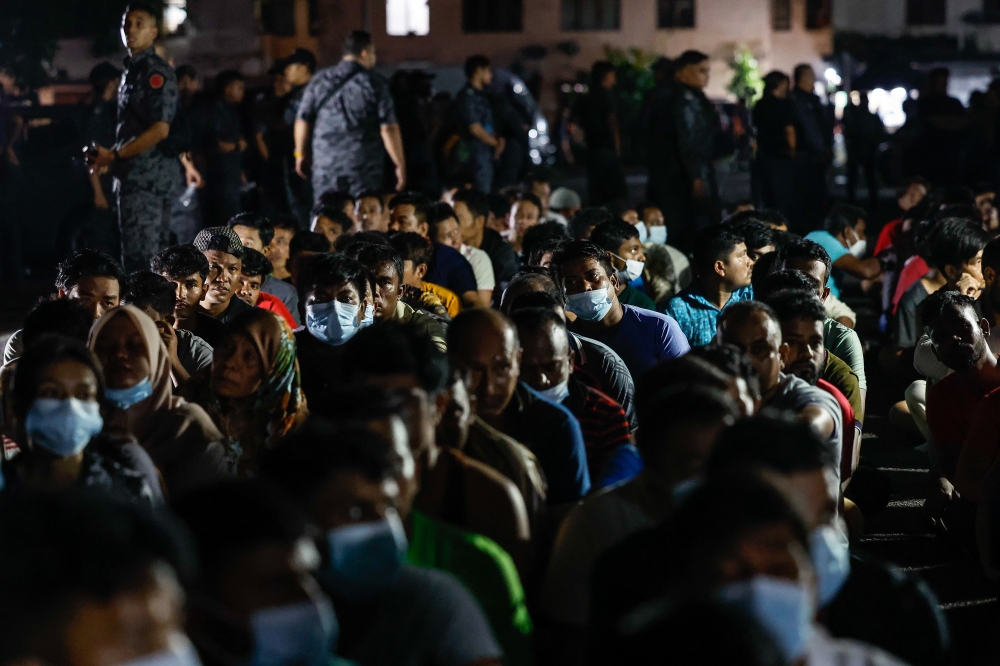
Amnesty International said that Putrajaya has failed to act on the commitments made during the 2022 general election to enhance freedom of expression. — Bernama pic
Join us on our WhatsApp Channel, follow us on Instagram, and receive browser alerts for the latest news you need to know.
By Zaf Seraj
Wednesday, 24 Apr 2024 8:10 AM MYT
PETALING JAYA, April 24 — In its 2024 The State of the World’s Human Rights report published today, global human rights watchdog Amnesty International said that Putrajaya has failed to act on the commitments made during the 2022 general election to enhance freedom of expression.
As democracy regressed to the levels of 1985 globally, the report shed light on six other areas where Malaysia fell short in 2023 — freedom of assembly, refugee and migrant rights, the death penalty, torture and ill-treatment, indigenous peoples’ rights and the right to a healthy environment.
Advertisement
“In 2023, the government failed to fulfil its own commitments to reform laws, restricting the right to freedom expression,” said Amnesty International Malaysia executive Director Katrina Jorene Maliamauv at the 2024 report launch, here, yesterday.
“The government not only failed to act on pledges to repeal laws restricting the rights to freedom of expression but continued to use them to investigate filmmakers and book editors among others,” the report said, referring to indie film Mentega Terbang, which revolved around a teenager’s curiosity on faith and the afterlife, and the arrest of book editor Kean Wong under the Sedition Act 1948 for the book Rebirth: Reformasi, Resistance and Hope in New Malaysia.
“The state also failed to act effectively and swiftly on death threats and intimidation levied against the filmmakers.
Advertisement
“It is the onus on this government to fulfil their obligations to protect all our rights without prejudice discrimination,” Katrina said, yesterday.
The government also allegedly silenced critical voices online and offline through the Communications and Multimedia Act 1998, the Sedition Act 1948, and through provisions of the Penal Code relating to causing disunity or hatred on grounds of religion and public fear or distress.
The international watchdog also took note of Malaysia’s efforts to erase the presence of the Lesbian, Gay, Bisexual, Transgender and Intersex (LGBTI) community from public spaces after authorities made international headlines for seizing LGBTI-themed watches from globally known watch company, Swatch, and introduced new penalties with a maximum of three years of imprisonment for wearing or selling such items.
“The Printing Presses and Publications Act was increasingly used to restrict the right to freedom of expression of LGBTI people. In February, the Home Ministry banned three books for ‘immoral’ content and promoting ‘LGBTI lifestyle’,” Amnesty International said in its report.
Nonetheless, Malaysia was not the only South-east Asian state to shackle freedom of expression as Thailand, the Philippines and Singapore also fell short in upholding this right.
“In Thailand, authorities persisted in applying laws restricting online communication to prosecute critics, while government critics in the Philippines continue to face spurious charges,” the report said.
Singapore, on the other hand, allegedly introduced new laws to restrict free speech by passing the Online Criminal Harms Act in July, giving the government broad powers to restrict or block online content which could be used against critics.
Further, as Malaysia’s treatment towards migrants and refugees drew international attention in the past few months after watchdog Human Rights Watch’s exposé in March, Amnesty International also noted the human rights violations in this regard.
Amnesty International also alleged that the government failed to investigate the deaths of 150 people, including women and children in immigration detention centres in 2022 despite persistent concerns about the conditions in the centres.

Undocumented immigrants are gathered up during a raid by the Immigration Department at the Baiduri Apartment, Taman Tasik Kesuma Beranang, Semenyih January 19, 2024. — Bernama pic
As many as 114 individuals were allegedly forcibly deported to Myanmar where it was unsafe for them, and the Malaysian government arrested over 1,000 undocumented migrant workers in Kuala Lumpur through targeted raids and 171 migrants in Johor as they attempted to lodge a police report on their agent’s failure to provide them with jobs.
However, the mistreatment of refugees and migrants was not unique to Malaysia.
Globally, Amnesty found that underlying public narratives were based on hatred and rooted in fear, which resulted in demonising marginalised groups which included refugees and migrants.
“Governments often treated refugees and migrants in abusive and racist ways,” Amnesty International said in its report.
Moreover, in Cambodia, Indonesia and Malaysia, indigenous people’s rights were ignored as their lives and livelihoods were threatened by commercial exploitation of their lands.
In April, seven people from the Temoq ingenious group challenged the government’s approval of an environmental impact assessment report a proposed palm oil project in Rompin, Pahang, claiming that the project violates their right to a clean, safe, and sustainable environment.
The organisation also highlighted that Malaysia was falling behind on its promise to finalise the climate change bill that was due in 2022, dampening Malaysians’ right to a healthy environment.
“The right to a healthy environment remains an urgent and fundamental right that is often ignored.
“We don’t have time to wait, and urgent action is needed. The solutions are there but the political will is not,” the Amnesty International Malaysia chief said during her speech at the report’s soft launch here, yesterday.
Further, the Peaceful Assembly Act 2012, the Penal Code and the Minor Offences Act 1955 were reportedly used against peaceful protesters during the Women’s March, the Labour Day rallies and persons from the Ahmadi religious sect for joining an assembly in support of LGBTI rights.
While Thailand enacted legislation against enforced disappearances, the problem persists in Malaysia.
Amnesty International documented a suspected case of enforced disappearances of Myanmarese refugee and activist Thuzar Maung, her husband Saw Than Tin Win and their three children.
They were reportedly abducted by unknown people from their home in Selangor which resulted in a police investigation, but they remain missing.
The organisation also reported the deaths of at least 13 people in police custody last year amid the lack of power and independence of the Independent Police Conduct Commission (IPCC).
Nonetheless, Amnesty International commended Malaysia’s effort to repeal the mandatory death penalty but stressed that the death sentence should be eradicated.
Although Malaysia was not flagged to use technology in breaching human rights, Amnesty International called for increased technological regulation globally.
The watchdog reported that spyware was being used against journalists and members of civil society worldwide, and facial recognition and biometric technology was being abused and taken advantage of by governments.

.png) 1 week ago
1 week ago
















 English (US) ·
English (US) ·